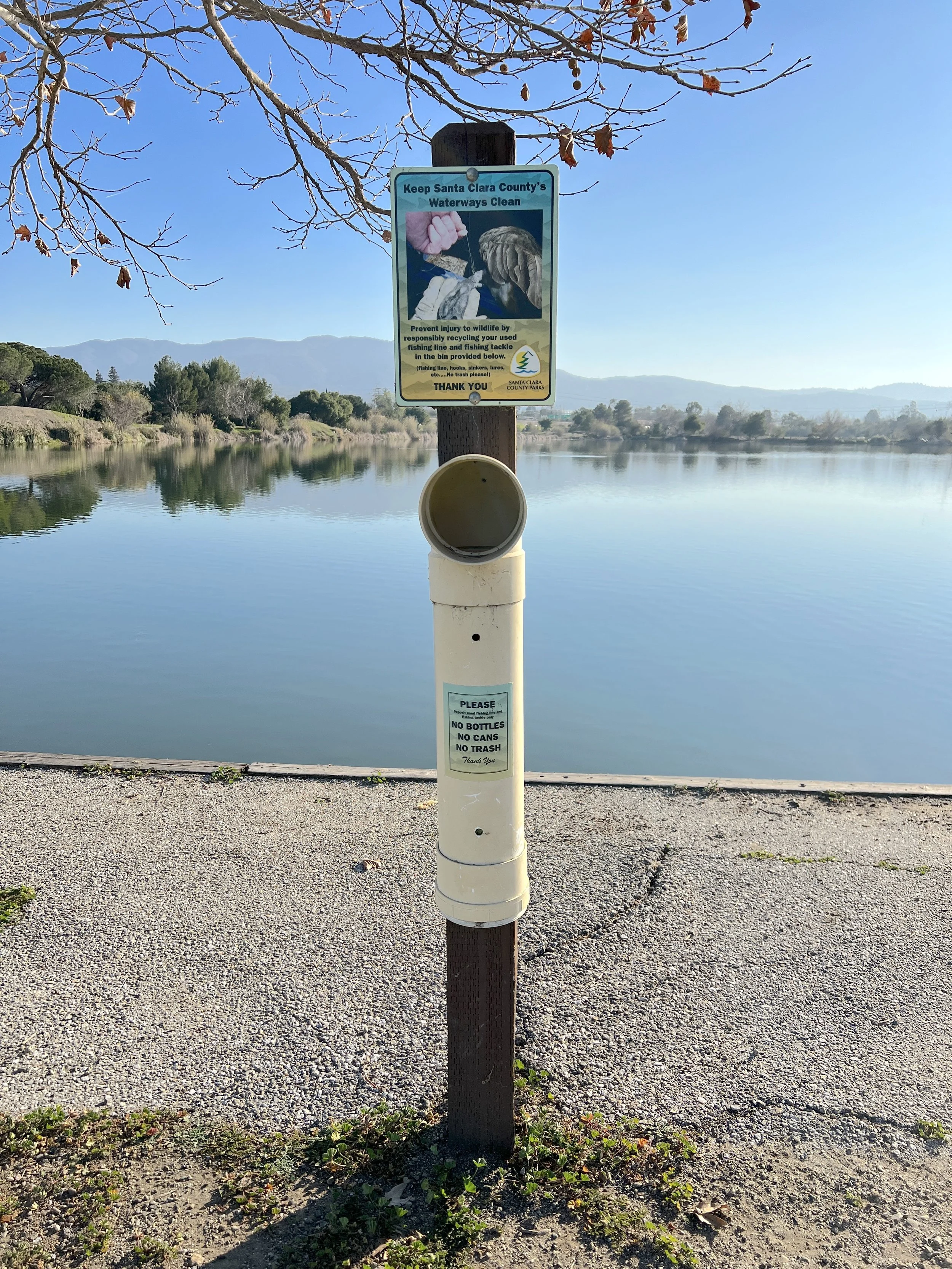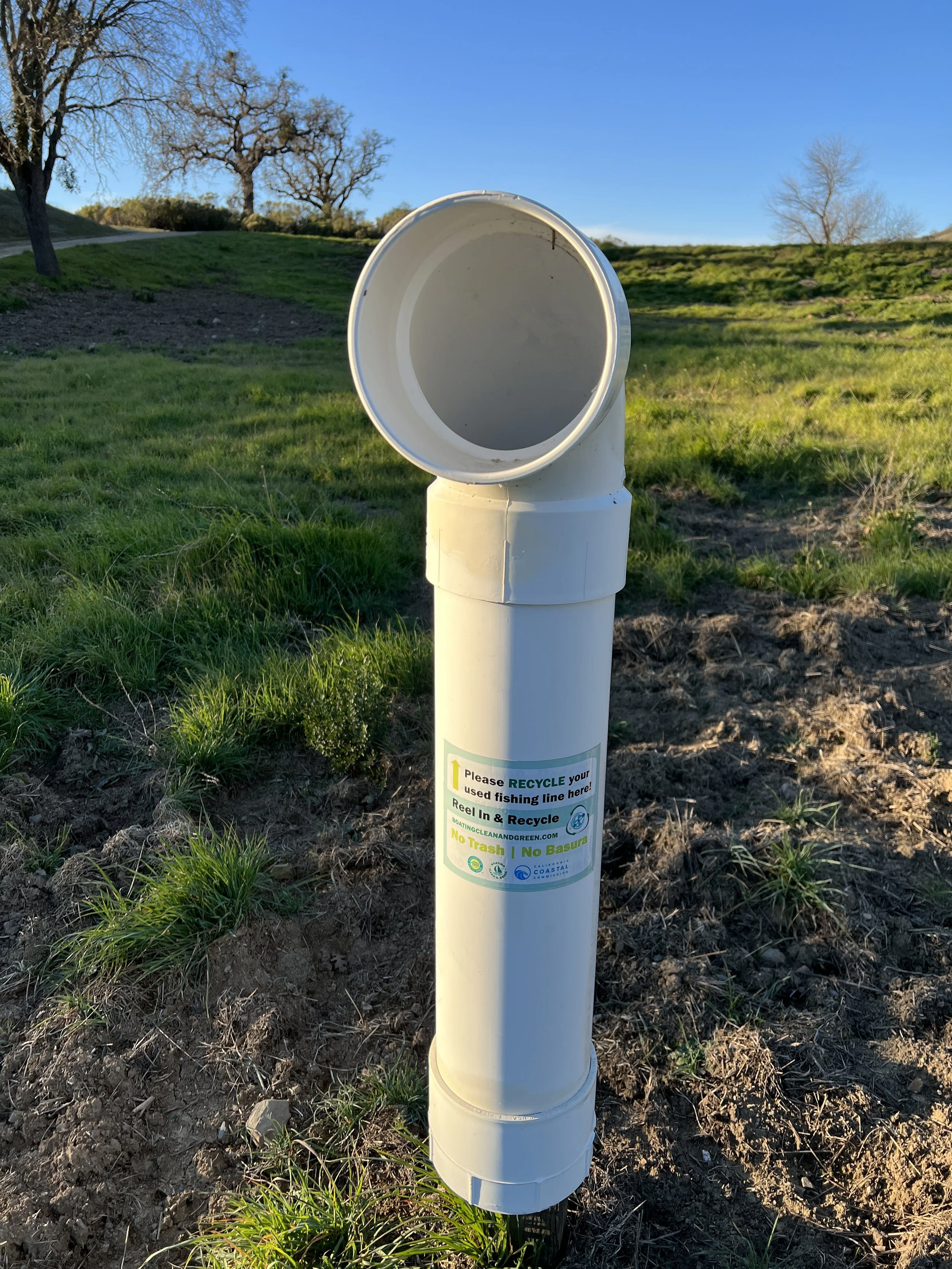Fishing Line: Don’t Catch a Bird!
Northern Rough-winged Swallow by Anthony Fuccella
While SCVAS encourages everyone to enjoy bird watching as a way to connect with nature, we know that there are many ways to enjoy the outdoors–including fishing. Some birders only notice the fish when they’re caught by the herons, ospreys, etc. But other birders–and members of the greater community–actively seek out opportunities to go fishing, and find joy in immersing themselves in the rhythms of nature (and sometimes, in a stream). Anyone who goes fishing takes on more responsibility to “pack it in, pack it out” than simply carrying out trash–they must carefully collect and dispose of fishing line, hooks, and gear.
Endangering Birds
Fishing line, weights and hooks that are caught in vegetation, lost in the water, or left behind on the bank pose hazards to birds. A bird can get tangled up in the fishing line or caught with a hook, impacting the bird’s ability to fly, swim, take cover, get food, etc. If a nesting bird is trapped or killed, its chicks may starve to death or be taken by a predator. Fishing weights are often made of lead, and if swallowed by a bird, will cause lead poisoning. Fishing hooks can puncture bills , wings, and other body parts, and cause internal damage if swallowed. Even if a bird appears to be able to move around with a hook or other fishing gear, its injuries will likely impact its health and probably cause the bird to die.
What to Do
If you fish: dispose of your fishing line responsibly. Often a fishing pier, cleaning station, boat launch, etc. will have a special receptacle to safely collect monofilament fishing line. If you snagged your hook or tackle in vegetation, do your best to remove it. Report it to the ranger if you can’t. Don’t leave your hook in a fish. Look around the area before you leave to make sure you’ve not dropped hooks or other gear, and collect them along with everything else so that you leave no trace.
Oka Ponds—San Jose
Grant Lake at Joseph D. Grant County Park
If you see fishing gear on a walk: pick it up if you can, report it if you can’t, and dispose of it responsibly.
If you catch a bird: don’t cut your line! Reel in the bird. Place a towel or other soft garment around it to protect it from thrashing around (and protect you from bill and wings). Gently untangle the bird: If the bird is hooked, push the barb all the way through, cut the barb off, and carefully back the hook out. If the bird is not hooked, simply untangle it and remove the line. If the bird is uninjured, release it promptly. If it is hurt or you think it needs attention, contact Wildlife Center of Silicon Valley or another licensed bird rehabilitator for help. SCVAS has additional resources listed on our website: https://scvas.org/resources
If you see an injured bird: capture it if you can, and cut away the entangled material. Secure it for transport (a covered cardboard box or paper bag, under a blanket, etc.) and take it for care.
Wildlife Education and Rehabilitation Center in Morgan Hill helps injured animals including ducks and other waterfowl, pelicans, shorebirds, and more. Call them at (408) 779-9372 (or, message them on Facebook). See https://www.werc-ca.org/about
International Bird Rescue rehabilitates aquatic birds including ducks, pelicans, cormorants. Call their Northern California Bird HelpLine at 707.207.0380 Extension 110 if you have a bird that needs help.
If you can’t catch the injured bird, please report it to the ranger.
Fishing Line Should Catch Fish, not Birds
Thousands of birds are killed or injured each year after getting tangled in or ingesting fishing gear. You can serve as a role model for responsible behavior when fishing; help to educate friends and neighbors; and whenever you see it, pick up fishing gear for responsible disposal.
Thank you for caring about birds.
Unlucky, Lucky Brown Pelican Patient #20-1658: https://www.birdrescue.org/patient-of-the-month-brown-pelican-20-1658/



